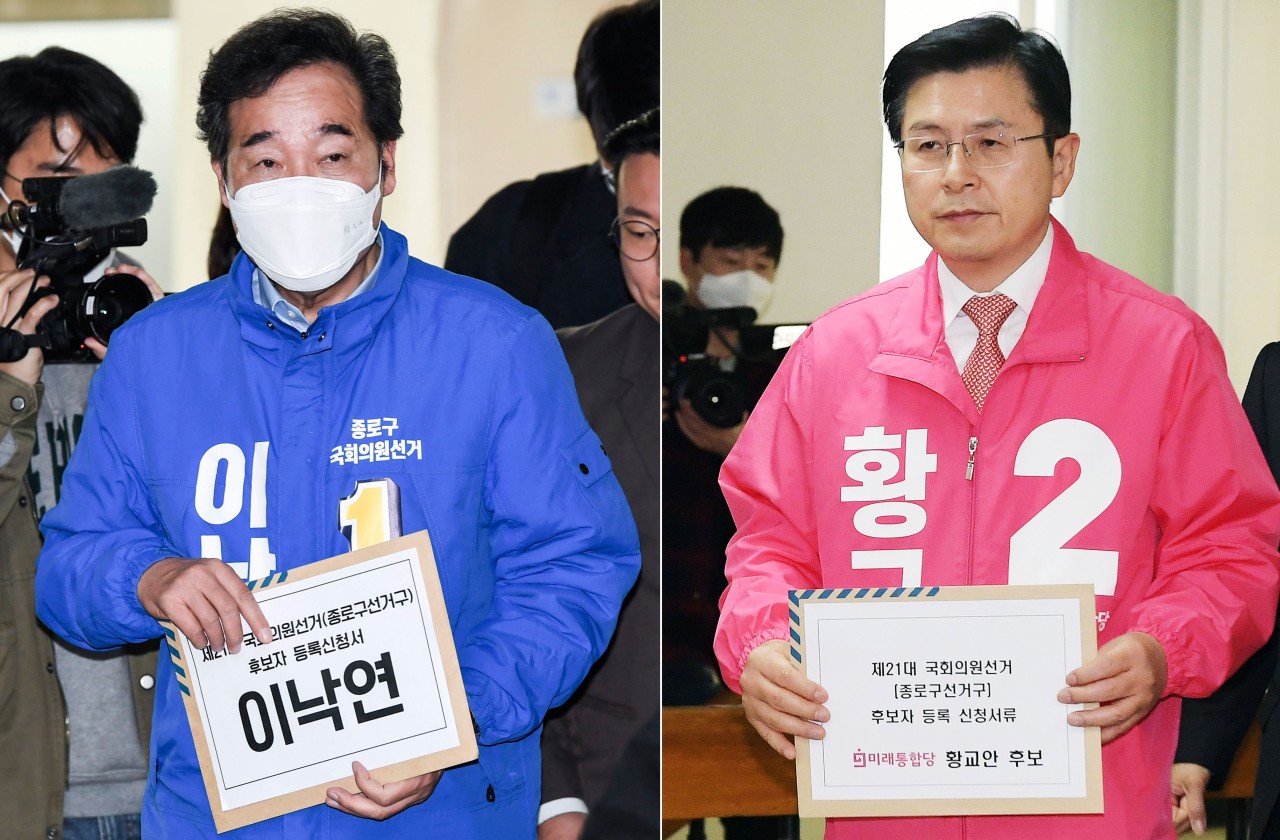
Appealing to voters with measures to tackle the new coronavirus, political parties ramped up election campaigning on Friday, the second and last day of candidate registration for the April 15 elections.
The candidate registration for the parliamentary polls will end at 6 p.m. according to the National Election Commission (NEC).
A total of 300 National Assembly seats will be up for grabs, with the number of the directly elected slots reaching 253 and that of proportional representation spots 47. South Korea's parliament is elected every four years.
Around 20 days before the polls, the new coronavirus has rattled South Korean politics, affecting the way candidates campaign and shifting the overall focus to how the government has handled the COVID-19 outbreak.
The ruling Democratic Party (DP) appealed for support for the government's ongoing efforts to contain the coronavirus and pledged measures to assist smaller firms and business owners hard hit by the pandemic.
"All DP candidates should prepare for the elections while consoling people and finding ways to ease their pain," said former Prime Minister Lee Nak-yon, who will run in the Jongno district in central Seoul.
The main opposition United Future Party (UFP) called for the need to "judge" the government, claiming that the Moon Jae-in administration bungled its response to the virus and failed in economic and security policies.
"The economy is on the verge of falling through. We should judge," UFP chairman Hwang Kyo-ahn, who will compete with Lee in Jongno, wrote on his Facebook page on Thursday.
The two major parties have, meanwhile, raised public eyebrows due to their attempts to secure more proportional representation (PR) seats with satelite parties.
The DP recently joined hands with liberals and minor parties for the birth of the tentatively named Platform Party in response to the UFP's establishment of an affiliated party that targets PR slots in the April elections.
The two largest parties are scurrying to dispatch their lawmakers to respective satellite parties, inviting public criticism that their acts have marred the intent of the new PR system that was adopted for the upcoming polls.
The moves are aimed at making sure the names of their affiliated parties are placed at the top of ballots so that voters can easily spot them.
As of Thursday, 51 percent of registered candidates were in their 50s, followed by those in their 60s with 26 percent and those in their 40s with 16 percent, according to the election watchdog.
Male candidates accounted for 81 percent of the total, compared with women with 19 percent.
Candidates can begin their official campaign activities on April 2.
Before the official electioneering period, their campaigning was allowed only in a limited manner, such as distributing business cards and establishing election offices. (Yonhap)
The candidate registration for the parliamentary polls will end at 6 p.m. according to the National Election Commission (NEC).
A total of 300 National Assembly seats will be up for grabs, with the number of the directly elected slots reaching 253 and that of proportional representation spots 47. South Korea's parliament is elected every four years.
Around 20 days before the polls, the new coronavirus has rattled South Korean politics, affecting the way candidates campaign and shifting the overall focus to how the government has handled the COVID-19 outbreak.
The ruling Democratic Party (DP) appealed for support for the government's ongoing efforts to contain the coronavirus and pledged measures to assist smaller firms and business owners hard hit by the pandemic.
"All DP candidates should prepare for the elections while consoling people and finding ways to ease their pain," said former Prime Minister Lee Nak-yon, who will run in the Jongno district in central Seoul.
The main opposition United Future Party (UFP) called for the need to "judge" the government, claiming that the Moon Jae-in administration bungled its response to the virus and failed in economic and security policies.
"The economy is on the verge of falling through. We should judge," UFP chairman Hwang Kyo-ahn, who will compete with Lee in Jongno, wrote on his Facebook page on Thursday.
The two major parties have, meanwhile, raised public eyebrows due to their attempts to secure more proportional representation (PR) seats with satelite parties.
The DP recently joined hands with liberals and minor parties for the birth of the tentatively named Platform Party in response to the UFP's establishment of an affiliated party that targets PR slots in the April elections.
The two largest parties are scurrying to dispatch their lawmakers to respective satellite parties, inviting public criticism that their acts have marred the intent of the new PR system that was adopted for the upcoming polls.
The moves are aimed at making sure the names of their affiliated parties are placed at the top of ballots so that voters can easily spot them.
As of Thursday, 51 percent of registered candidates were in their 50s, followed by those in their 60s with 26 percent and those in their 40s with 16 percent, according to the election watchdog.
Male candidates accounted for 81 percent of the total, compared with women with 19 percent.
Candidates can begin their official campaign activities on April 2.
Before the official electioneering period, their campaigning was allowed only in a limited manner, such as distributing business cards and establishing election offices. (Yonhap)

















![[KH Explains] Hyundai's full hybrid edge to pay off amid slow transition to pure EVs](http://res.heraldm.com/phpwas/restmb_idxmake.php?idx=652&simg=/content/image/2024/04/18/20240418050645_0.jpg&u=20240418181020)

![[Today’s K-pop] Zico drops snippet of collaboration with Jennie](http://res.heraldm.com/phpwas/restmb_idxmake.php?idx=642&simg=/content/image/2024/04/18/20240418050702_0.jpg&u=)